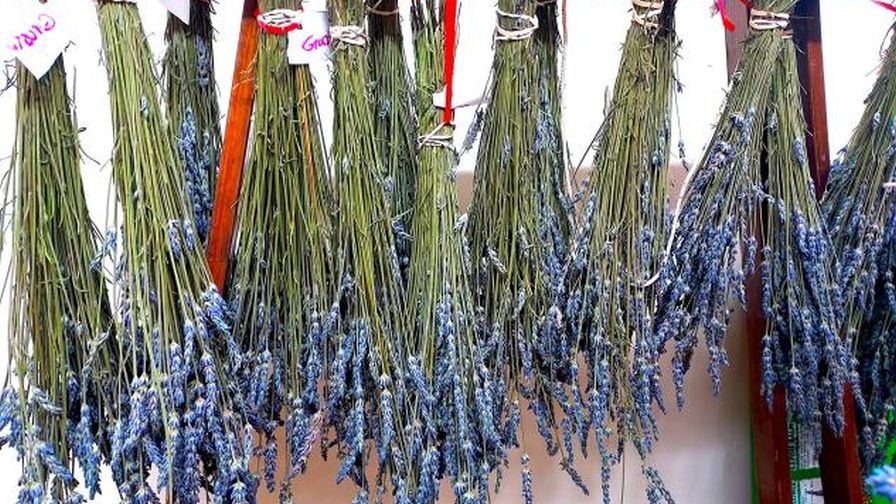Meeting The Demand For Edibles: Peace Tree Farm

Lloyd and Candy Traven at Peace Tree Farm believe the production of finished edible crops is well suited for the high end greenhouse space they have available during the winter.
Photo courtesy of Peace Tree Farm
This is one of four articles on how growers are appealing to the growing interest in edibles. Click to read about Altman Plants, High Meadows Farm and Go Green Agriculture Inc.
While consumer interest and response to Peace Tree Farm’s unique annuals and foliage plants continues to increase, herb and vegetable starter plants is where the company makes its money.
“We are certified organic, so organic farmers and CSAs (Community Supported Agriculture) contract with us through direct sales and brokers,” says Lloyd Traven, co-owner of the Kintnersville, Pa., operation.
“We sell the vegetables, herbs and ornamentals to growers all over North America,” he says.
The company also has a finished plant program of vegetables in different configurations for garden centers, which carries much of load for them, particularly in the spring.
Not A Silver Bullet
Traven wants bedding plant growers who are experiencing financial difficulties to know that greenhouse vegetables won’t solve their problems.
“Some growers are looking at greenhouse vegetables as the savior of their company because they are not making any money from bedding plants,” Traven says. “I am looking at this from a different perspective because I am making money from selling ornamental plants now.”
According to Traven, Peace Tree Farm’s situation has turned around for his company in the last year and a half. There were some years prior to that during which the company was not making money on annuals.
The turnaround in sales has come without any greenhouse produce production at all. Rather, the turnaround for his company was the result of completely changing the company’s business model.

Peace Tree Farm is looking to finish herbs and vegetables, including mixed greens and microgreens, for a variety of customers who have said they will buy whatever the company can produce.
Photo courtesy of Peace Tree Farm
“We needed to change our customer base, how we sell plants to them and why we sell to them,” Traven says. “We have walked away totally from mainstream products. We are almost a no-petunia zone. All of the typical annual plants are just not here anymore.”
Some of the plants no longer available include calibrachoa, scaevola, verbena and zonal geraniums. The company will grow for order, but will not speculate one pot whatsoever.
“We have plenty of geraniums, but we are only doing heirloom foliage geraniums, the oddball ones,” Traven says. “If there is a variegated geranium, we’ll grow it. The odd stuff is what we do.”
Because Peace Tree Farm isn’t growing typical bedding plants anymore, the company has become more active with social media.
“We market more to consumers than we do to garden centers,” Traven says. “We get people talking about our plants. Our biggest growth is with botanical gardens and museums. Rare plant sales and things like that. Those are the people who are buying our full range of unique selections, including annuals, tropicals, edible ornamentals and perennials.”
Botanical gardens have been key customers in returning Peace Tree Farm to profitability. The botanical gardens give the company a push by promoting plants to its guests and through social media.
“The botanical gardens are where consumers are seeing this fun stuff, and they talk about it,” Traven says. “They then go to their local garden centers and say ‘I want these plants.’ The garden centers then contact us for the plants. It’s the botanical gardens and their social media efforts that generate the interest with consumers.”
Expanding Winter Production
Finished vegetables would add to the revenue Peace Tree Farm can generate during winter months, along with new business that has come recently from being the primary sourcing company for forcing flowers for major winter flower shows.
“We are doing the Philadelphia Flower Show, which is the largest and oldest indoor flower show, along with the Macy’s Flower Shows in New York and Philadelphia and shows in Boston, Chicago, Washington, D.C., Connecticut and New Jersey,” Traven says. “Three years ago we didn’t have any of these shows as major customers, but we invested heavily in servicing a totally unique market niche. These shows provide significant cash flow in the dead of winter.”
As a result of this new business, Christmas has become a minor business for Peace Tree.
“We are growing a few poinsettias this year,” Traven says. “We have dropped 4- and 6-inch poinsettias. We will give up every inch of space of poinsettias for any other crop and that’s where the opportunity for finished vegetables comes in.”
Fifty percent of Peace Tree’s space in the winter is now devoted to flower show forcing. Another 10 to 15 percent of space is devoted to year-round propagation. According to Traven, that still leaves a lot of high quality, high end greenhouse space available for another crop.
“We are looking at finished herbs and vegetables for the food market, which includes mixed greens and a few other items,” Traven says.
Traven has four different customers, including a national and regional grocery chain, lined up, all of whom have said they will take 100 percent of the finished vegetables he can profitably grow during this period of the year.
“Some of the varieties we are currently propagating may stay the same, but the production method would totally change,” Traven says. “But the structure and infrastructure shouldn’t have to change at all. I would be selling the last of these finished crops in March, when I would start selling the transplants for spring.”
For more information on Peace Tree Farm, contact 610-847-8152; or visit Peace Tree Farm’s website or Facebook page.





